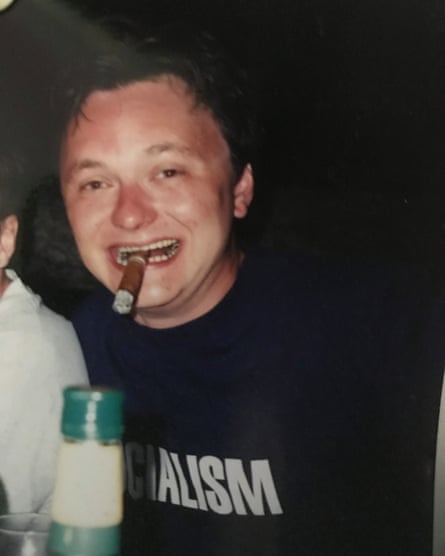The playwright Jez Butterworth (Jerusalem, Mojo) and the musician Alex James (Blur, cheese) were staggering out of the Groucho Club back in the late 90s when they had the realisation that they were both nearly 30 – positively youthful for a playwright, but in rock’n’roll terms, a veritable Methuselah.
Boxing, as Marsellus Wallace forcefully reminds the ageing prize fighter Butch in Pulp Fiction, is not an industry where people grow old gracefully. “See, this business is filled to the brim with unrealistic motherfuckers. Motherfuckers who thought their ass would age like wine. If you mean it turns to vinegar, it does. If you mean it gets better with age, it don’t.”
The music business is not dissimilar. I had my own Marsellus Wallace moment in about 2002. By that point, I had been working in the industry for more than a decade. I was 35 and spending my spare time hacking away at the novel that would become Kill Your Friends. But that was still a few years distant as I stood at the back of a gig somewhere in London (The Barfly? The Dublin Castle? The 100 Club? Somewhere like that) becoming increasingly conscious of an uncomfortable fact – I had no idea if I liked the band on stage or not.
This was not the same as knowing whether a new band might be successful or not – the much trickier proposition that A&R men deal with all the time. (And my record in this department was less than stellar – in the decade gone by I had laughingly tossed early demo tapes by Coldplay and Muse into the wastepaper basket, while believing Mogwai would be bigger than Pink Floyd. This was a function of taste, really. I liked Mogwai and never much cared for Coldplay or Muse. But at least I knew that.) This sensation, of staring at a stage and not knowing whether I liked what I was seeing or not, this was new. And suddenly I saw the road ahead opening up: standing at the back of that gig at 40. At 50. Not quite knowing if you liked what you were seeing or not. Looking to gauge the reactions of others in the crowd. Trying to second-guess what would once – just five or 10 years earlier – have been instinctive. I had run fair and square into an old rock’n’roll truism: the little girls know what the old men can’t understand.
At that moment, I decided to junk my original plan of quietly carrying on in music until – maybe, one day – I finished the novel. I left and decided to spend the next couple of years and all the cash I had in the bank trying to get the book right. In the end, it took four years and all the cash my girlfriend had, too, but hey-ho, let’s go and all that …
In my new novel, Kill ’Em All, Steven Stelfox, the protagonist of Kill Your Friends, returns at the age of 47. He was 27 in the original book, which was set in 1997, and he has undergone the usual sea-changes most of us go through in our 30s and 40s (and some not so usual – he is now worth $200m). The hangovers once shrugged off in a morning are three-day torture marathons. He no longer takes drugs (with one fairly robust lapse, in a moment of extreme crisis), but he still likes a drink. “If you have to stop drinking,” he reflects, “you’re a fucking loser.” Of course, it wasn’t quite this simple for some, and a lot of people in the music industry didn’t quite survive the 90s, that last great gold rush.

Now, you can say this about any era: some people didn’t survive the 60s, the 70s or the 80s. “They’re selling hippy wigs in Woolworths, man …” Danny the drug dealer laments in Withnail & I, as the 60s shade into the 70s. But the 90s were more hardcore. This was the decade that, for much of the population, normalised drugs, clubbing and insanely heavy drinking; that introduced a whole generation to the kind of three-day-weekends that, in times gone by, would have solely been the property of outliers, the hardcore mods or the likes of Keith Richards and Johnny Thunders. There was Kevin from accounts talking about how he just made it into work on time on Monday morning, having ground up the last pill and snorted it with his mates in the car coming back from Creamfields. There was Karen from marketing, quietly on the phone, organising three grams for T in the Park. Danny in the mailroom, stirring sulphate into his tea.
When I look back at the diaries I kept in the 90s, the ones I used as a rough backbone for Kill Your Friends, just the whiff coming off the page is enough to make me teeter back on my heels. A typical month in February or March would have seen the Brit awards, a trip to Miami for the Winter Music festival, then on to Texas for South by Southwest. Any one of these would have been a three-day bender that would have put me in hospital now. And in between, there would have been gigs, launch parties, signing parties and all the rest of it, every other night. Nowadays I’m more likely to be at my desk at 6am than falling in the front door.
Unsurprisingly, not everyone gets through a decade of this kind of thing intact. At some point in their 30s, most people have their own Marsellus Wallace moment. The fortunate retrain and discover new careers; find second acts to their lives. But many find it hard to let go. They wind up at the back of the gig in the bad leather jacket wondering what is going on. And the sensation of the most exciting part of your life being behind you at a relatively young age, the feeling that there is only leftover life to kill, carries with it an ineffable whiff of sadness. Some people I knew died, others went to rehab, many struggle with mental health issues.

There are exceptions, of course. I think of my friend Jeff Barrett, still running Heavenly Records nearly 30 years after the label discovered the Manic Street Preachers and Beth Orton, still putting out an incredible range of exciting new music by acts half his age. But for every Jeff – music runs through him like blood – there are many more for whom rock’n’roll was life in their teens, a vital force in their 20s, less central in their 30s and pretty much nonexistent beyond the age of 40.
Stelfox, of course, was never so much concerned with music as he was with power and money. It is people like him who tend to wind up running corporations. At a pivotal moment in the new novel, he takes a woman 20 years younger than him – a woke, hardworking millennial – out to dinner. Zoning out as she talks, he reflects on how, “back in the old days, things were different of course. Much more straightforward. You’d drink yourselves senseless, bang a mountain of racket and get your cock out. Simpler times.”
His yearning for a return to a sepia-tinted Hovis-ad era of wanton hedonism and sexual abuse is palpable. For me, not so much. It’s more fun now to watch the Brits the same way the rest of the nation does – jeering from your armchair with a glass in your hand – rather than trying to become the fourth person to fit into a toilet cubicle at the O2.
And it must be strange for some of the old guard still in the music business today, watching the next generation, the ones who were busy being born in the 90s, rather than being busy frying their minds. Watching them not barge off to the toilets wrap in hand while the band are mid-set. Watching them charge into the office on a full night’s sleep rather than a head full of coke. Watching them routinely not commit sexual assault. Not to say that any of these things have ceased to be, of course, but I think for many of the millennials working in the industry today they form more of a fringe interest than the mainstream.
In this respect, Stelfox will be thinking that he timed his moment in the sun exactly right.
Kill ’Em All by John Niven is published by William Heinemann at £16.99. To order a copy for £14.61 go to guardianbookshop.com

Comments (…)
Sign in or create your Guardian account to join the discussion